Business Law and Ethics: UK Employment Law and Company Formation
VerifiedAdded on 2023/06/10
|9
|2535
|323
Report
AI Summary
This report provides a comprehensive overview of UK employment law and the process of company formation. It begins by discussing the historical structure of UK employment law, analyzing its evolution and the rights and responsibilities of employers and employees. The report then delves into the fundamental features of company formation in the UK, outlining the essential steps involved, from choosing a company name and preparing essential documentation to obtaining a certificate of incorporation. Key aspects covered include the application of incorporation, the memorandum of association, the articles of association, and the role of the registrar. The report emphasizes the legal requirements, restrictions, and procedures that businesses must adhere to when establishing and operating within the UK legal framework, highlighting the importance of compliance with relevant legislation to ensure smooth business operations and protect the rights of both employers and employees.
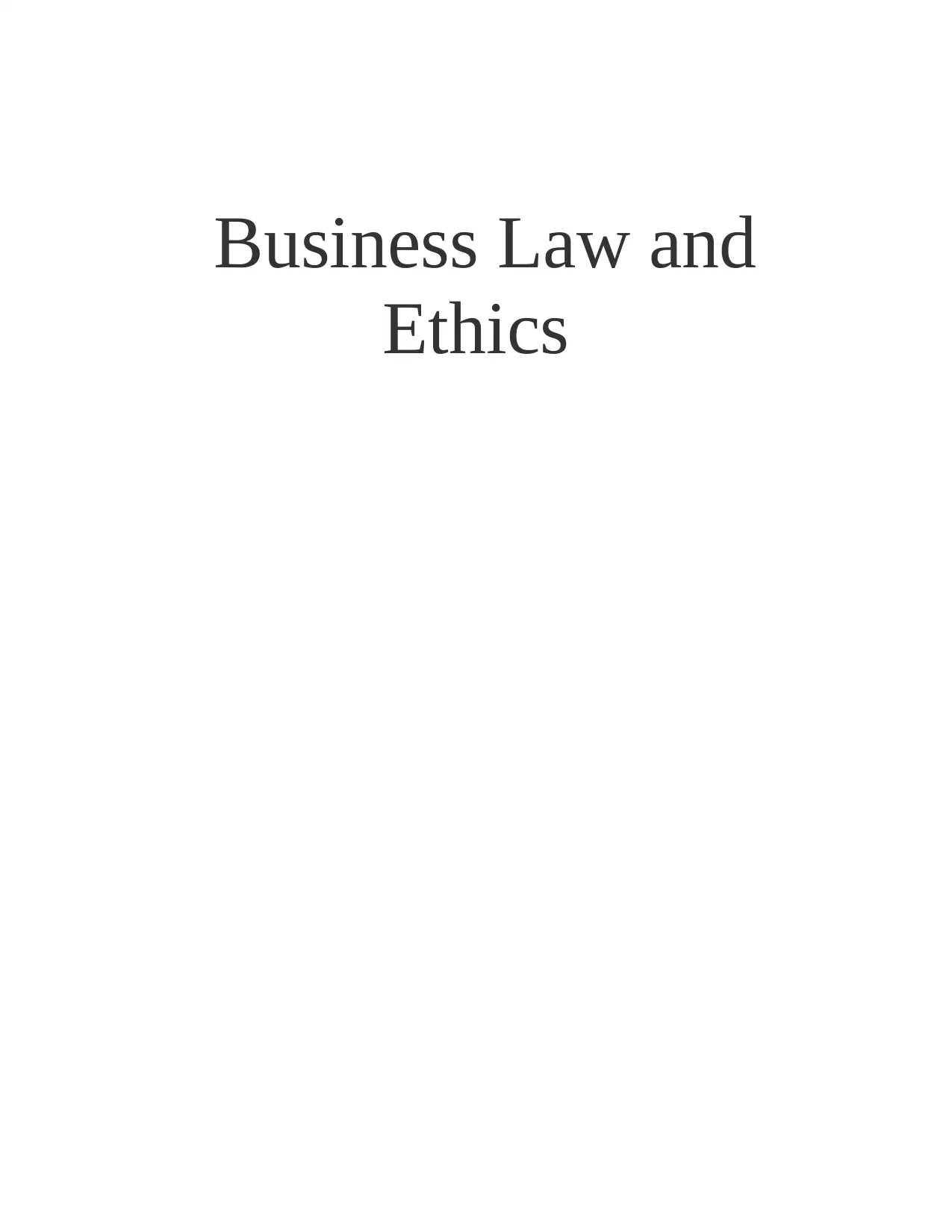
Business Law and
Ethics
Ethics
Paraphrase This Document
Need a fresh take? Get an instant paraphrase of this document with our AI Paraphraser
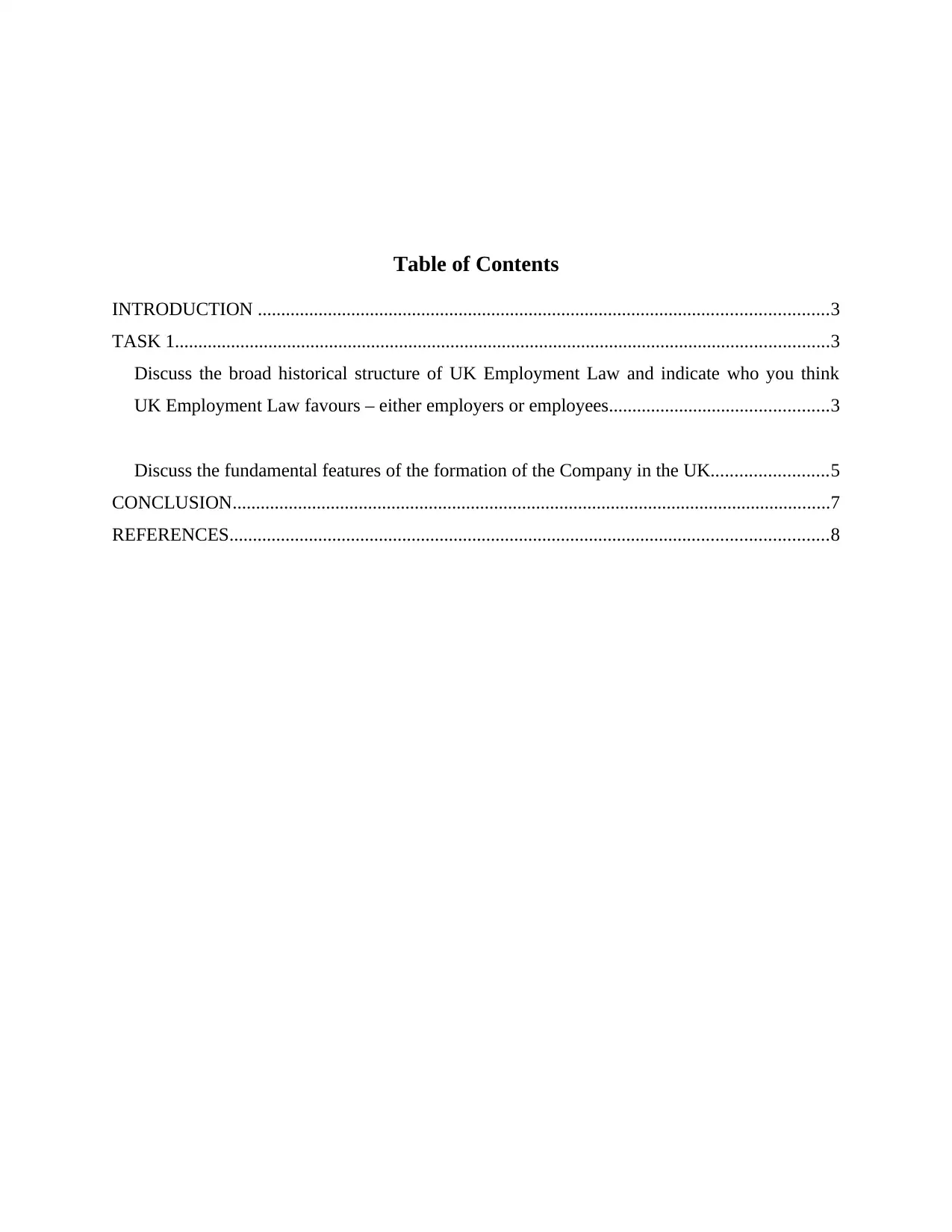
Table of Contents
INTRODUCTION ..........................................................................................................................3
TASK 1............................................................................................................................................3
Discuss the broad historical structure of UK Employment Law and indicate who you think
UK Employment Law favours – either employers or employees...............................................3
Discuss the fundamental features of the formation of the Company in the UK.........................5
CONCLUSION................................................................................................................................7
REFERENCES................................................................................................................................8
INTRODUCTION ..........................................................................................................................3
TASK 1............................................................................................................................................3
Discuss the broad historical structure of UK Employment Law and indicate who you think
UK Employment Law favours – either employers or employees...............................................3
Discuss the fundamental features of the formation of the Company in the UK.........................5
CONCLUSION................................................................................................................................7
REFERENCES................................................................................................................................8
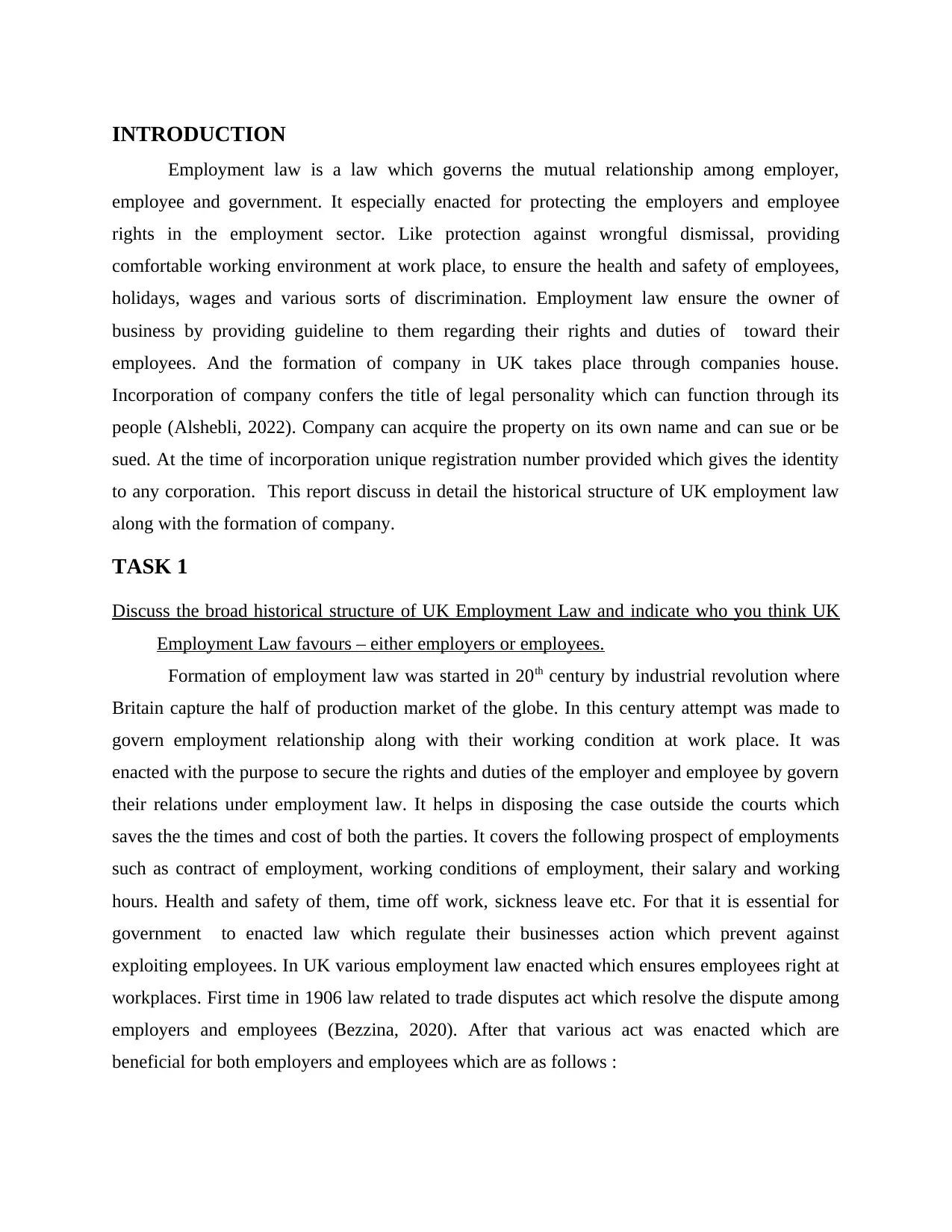
INTRODUCTION
Employment law is a law which governs the mutual relationship among employer,
employee and government. It especially enacted for protecting the employers and employee
rights in the employment sector. Like protection against wrongful dismissal, providing
comfortable working environment at work place, to ensure the health and safety of employees,
holidays, wages and various sorts of discrimination. Employment law ensure the owner of
business by providing guideline to them regarding their rights and duties of toward their
employees. And the formation of company in UK takes place through companies house.
Incorporation of company confers the title of legal personality which can function through its
people (Alshebli, 2022). Company can acquire the property on its own name and can sue or be
sued. At the time of incorporation unique registration number provided which gives the identity
to any corporation. This report discuss in detail the historical structure of UK employment law
along with the formation of company.
TASK 1
Discuss the broad historical structure of UK Employment Law and indicate who you think UK
Employment Law favours – either employers or employees.
Formation of employment law was started in 20th century by industrial revolution where
Britain capture the half of production market of the globe. In this century attempt was made to
govern employment relationship along with their working condition at work place. It was
enacted with the purpose to secure the rights and duties of the employer and employee by govern
their relations under employment law. It helps in disposing the case outside the courts which
saves the the times and cost of both the parties. It covers the following prospect of employments
such as contract of employment, working conditions of employment, their salary and working
hours. Health and safety of them, time off work, sickness leave etc. For that it is essential for
government to enacted law which regulate their businesses action which prevent against
exploiting employees. In UK various employment law enacted which ensures employees right at
workplaces. First time in 1906 law related to trade disputes act which resolve the dispute among
employers and employees (Bezzina, 2020). After that various act was enacted which are
beneficial for both employers and employees which are as follows :
Employment law is a law which governs the mutual relationship among employer,
employee and government. It especially enacted for protecting the employers and employee
rights in the employment sector. Like protection against wrongful dismissal, providing
comfortable working environment at work place, to ensure the health and safety of employees,
holidays, wages and various sorts of discrimination. Employment law ensure the owner of
business by providing guideline to them regarding their rights and duties of toward their
employees. And the formation of company in UK takes place through companies house.
Incorporation of company confers the title of legal personality which can function through its
people (Alshebli, 2022). Company can acquire the property on its own name and can sue or be
sued. At the time of incorporation unique registration number provided which gives the identity
to any corporation. This report discuss in detail the historical structure of UK employment law
along with the formation of company.
TASK 1
Discuss the broad historical structure of UK Employment Law and indicate who you think UK
Employment Law favours – either employers or employees.
Formation of employment law was started in 20th century by industrial revolution where
Britain capture the half of production market of the globe. In this century attempt was made to
govern employment relationship along with their working condition at work place. It was
enacted with the purpose to secure the rights and duties of the employer and employee by govern
their relations under employment law. It helps in disposing the case outside the courts which
saves the the times and cost of both the parties. It covers the following prospect of employments
such as contract of employment, working conditions of employment, their salary and working
hours. Health and safety of them, time off work, sickness leave etc. For that it is essential for
government to enacted law which regulate their businesses action which prevent against
exploiting employees. In UK various employment law enacted which ensures employees right at
workplaces. First time in 1906 law related to trade disputes act which resolve the dispute among
employers and employees (Bezzina, 2020). After that various act was enacted which are
beneficial for both employers and employees which are as follows :
⊘ This is a preview!⊘
Do you want full access?
Subscribe today to unlock all pages.

Trusted by 1+ million students worldwide
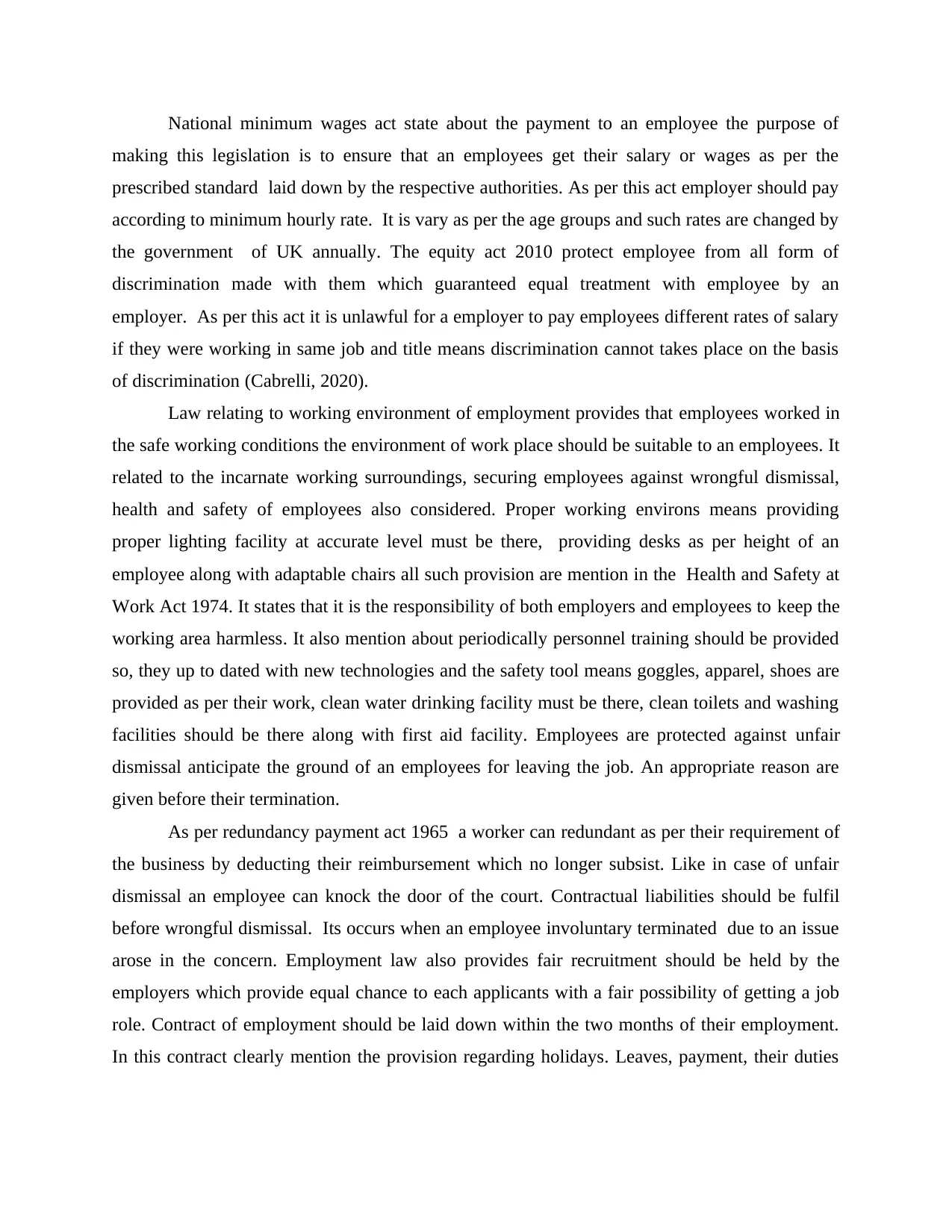
National minimum wages act state about the payment to an employee the purpose of
making this legislation is to ensure that an employees get their salary or wages as per the
prescribed standard laid down by the respective authorities. As per this act employer should pay
according to minimum hourly rate. It is vary as per the age groups and such rates are changed by
the government of UK annually. The equity act 2010 protect employee from all form of
discrimination made with them which guaranteed equal treatment with employee by an
employer. As per this act it is unlawful for a employer to pay employees different rates of salary
if they were working in same job and title means discrimination cannot takes place on the basis
of discrimination (Cabrelli, 2020).
Law relating to working environment of employment provides that employees worked in
the safe working conditions the environment of work place should be suitable to an employees. It
related to the incarnate working surroundings, securing employees against wrongful dismissal,
health and safety of employees also considered. Proper working environs means providing
proper lighting facility at accurate level must be there, providing desks as per height of an
employee along with adaptable chairs all such provision are mention in the Health and Safety at
Work Act 1974. It states that it is the responsibility of both employers and employees to keep the
working area harmless. It also mention about periodically personnel training should be provided
so, they up to dated with new technologies and the safety tool means goggles, apparel, shoes are
provided as per their work, clean water drinking facility must be there, clean toilets and washing
facilities should be there along with first aid facility. Employees are protected against unfair
dismissal anticipate the ground of an employees for leaving the job. An appropriate reason are
given before their termination.
As per redundancy payment act 1965 a worker can redundant as per their requirement of
the business by deducting their reimbursement which no longer subsist. Like in case of unfair
dismissal an employee can knock the door of the court. Contractual liabilities should be fulfil
before wrongful dismissal. Its occurs when an employee involuntary terminated due to an issue
arose in the concern. Employment law also provides fair recruitment should be held by the
employers which provide equal chance to each applicants with a fair possibility of getting a job
role. Contract of employment should be laid down within the two months of their employment.
In this contract clearly mention the provision regarding holidays. Leaves, payment, their duties
making this legislation is to ensure that an employees get their salary or wages as per the
prescribed standard laid down by the respective authorities. As per this act employer should pay
according to minimum hourly rate. It is vary as per the age groups and such rates are changed by
the government of UK annually. The equity act 2010 protect employee from all form of
discrimination made with them which guaranteed equal treatment with employee by an
employer. As per this act it is unlawful for a employer to pay employees different rates of salary
if they were working in same job and title means discrimination cannot takes place on the basis
of discrimination (Cabrelli, 2020).
Law relating to working environment of employment provides that employees worked in
the safe working conditions the environment of work place should be suitable to an employees. It
related to the incarnate working surroundings, securing employees against wrongful dismissal,
health and safety of employees also considered. Proper working environs means providing
proper lighting facility at accurate level must be there, providing desks as per height of an
employee along with adaptable chairs all such provision are mention in the Health and Safety at
Work Act 1974. It states that it is the responsibility of both employers and employees to keep the
working area harmless. It also mention about periodically personnel training should be provided
so, they up to dated with new technologies and the safety tool means goggles, apparel, shoes are
provided as per their work, clean water drinking facility must be there, clean toilets and washing
facilities should be there along with first aid facility. Employees are protected against unfair
dismissal anticipate the ground of an employees for leaving the job. An appropriate reason are
given before their termination.
As per redundancy payment act 1965 a worker can redundant as per their requirement of
the business by deducting their reimbursement which no longer subsist. Like in case of unfair
dismissal an employee can knock the door of the court. Contractual liabilities should be fulfil
before wrongful dismissal. Its occurs when an employee involuntary terminated due to an issue
arose in the concern. Employment law also provides fair recruitment should be held by the
employers which provide equal chance to each applicants with a fair possibility of getting a job
role. Contract of employment should be laid down within the two months of their employment.
In this contract clearly mention the provision regarding holidays. Leaves, payment, their duties
Paraphrase This Document
Need a fresh take? Get an instant paraphrase of this document with our AI Paraphraser
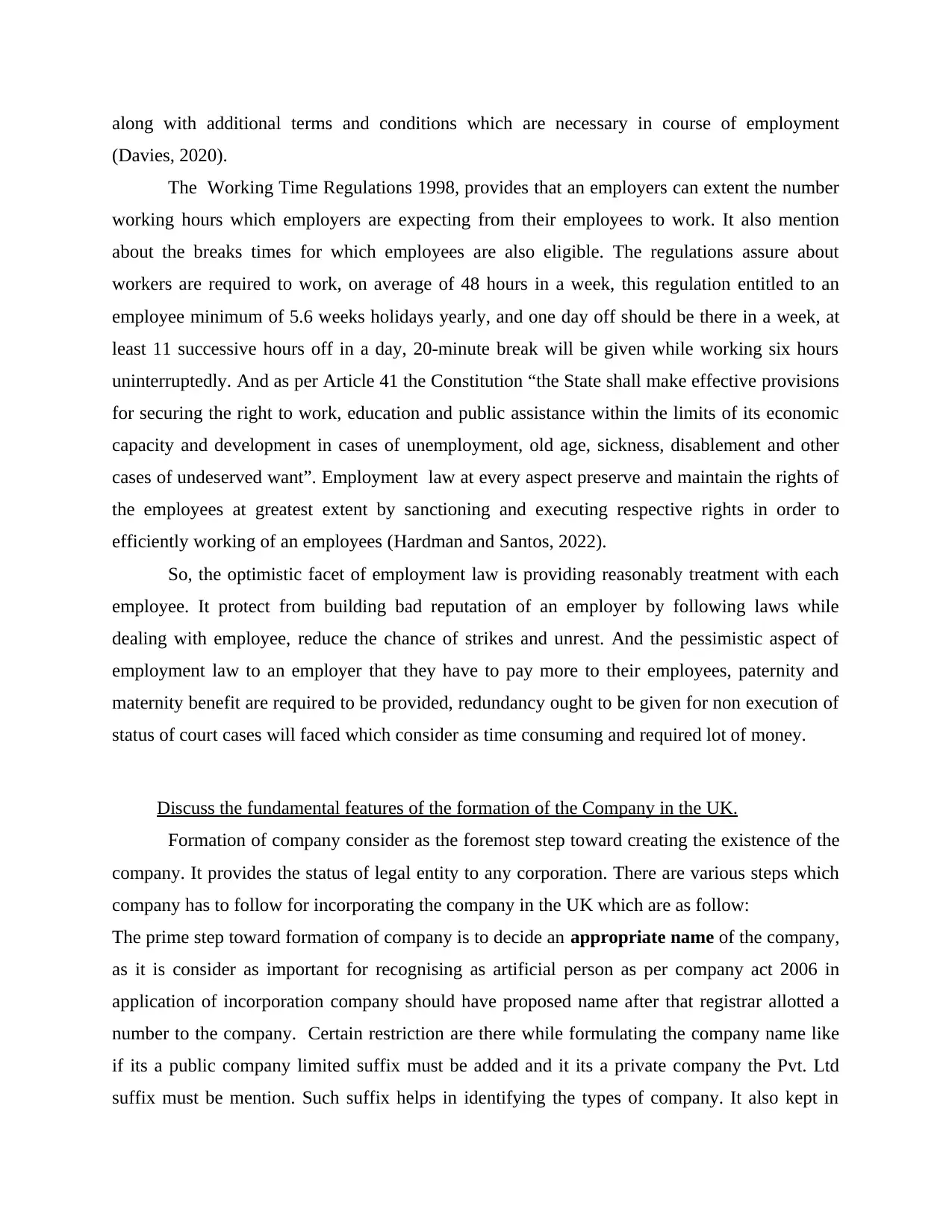
along with additional terms and conditions which are necessary in course of employment
(Davies, 2020).
The Working Time Regulations 1998, provides that an employers can extent the number
working hours which employers are expecting from their employees to work. It also mention
about the breaks times for which employees are also eligible. The regulations assure about
workers are required to work, on average of 48 hours in a week, this regulation entitled to an
employee minimum of 5.6 weeks holidays yearly, and one day off should be there in a week, at
least 11 successive hours off in a day, 20-minute break will be given while working six hours
uninterruptedly. And as per Article 41 the Constitution “the State shall make effective provisions
for securing the right to work, education and public assistance within the limits of its economic
capacity and development in cases of unemployment, old age, sickness, disablement and other
cases of undeserved want”. Employment law at every aspect preserve and maintain the rights of
the employees at greatest extent by sanctioning and executing respective rights in order to
efficiently working of an employees (Hardman and Santos, 2022).
So, the optimistic facet of employment law is providing reasonably treatment with each
employee. It protect from building bad reputation of an employer by following laws while
dealing with employee, reduce the chance of strikes and unrest. And the pessimistic aspect of
employment law to an employer that they have to pay more to their employees, paternity and
maternity benefit are required to be provided, redundancy ought to be given for non execution of
status of court cases will faced which consider as time consuming and required lot of money.
Discuss the fundamental features of the formation of the Company in the UK.
Formation of company consider as the foremost step toward creating the existence of the
company. It provides the status of legal entity to any corporation. There are various steps which
company has to follow for incorporating the company in the UK which are as follow:
The prime step toward formation of company is to decide an appropriate name of the company,
as it is consider as important for recognising as artificial person as per company act 2006 in
application of incorporation company should have proposed name after that registrar allotted a
number to the company. Certain restriction are there while formulating the company name like
if its a public company limited suffix must be added and it its a private company the Pvt. Ltd
suffix must be mention. Such suffix helps in identifying the types of company. It also kept in
(Davies, 2020).
The Working Time Regulations 1998, provides that an employers can extent the number
working hours which employers are expecting from their employees to work. It also mention
about the breaks times for which employees are also eligible. The regulations assure about
workers are required to work, on average of 48 hours in a week, this regulation entitled to an
employee minimum of 5.6 weeks holidays yearly, and one day off should be there in a week, at
least 11 successive hours off in a day, 20-minute break will be given while working six hours
uninterruptedly. And as per Article 41 the Constitution “the State shall make effective provisions
for securing the right to work, education and public assistance within the limits of its economic
capacity and development in cases of unemployment, old age, sickness, disablement and other
cases of undeserved want”. Employment law at every aspect preserve and maintain the rights of
the employees at greatest extent by sanctioning and executing respective rights in order to
efficiently working of an employees (Hardman and Santos, 2022).
So, the optimistic facet of employment law is providing reasonably treatment with each
employee. It protect from building bad reputation of an employer by following laws while
dealing with employee, reduce the chance of strikes and unrest. And the pessimistic aspect of
employment law to an employer that they have to pay more to their employees, paternity and
maternity benefit are required to be provided, redundancy ought to be given for non execution of
status of court cases will faced which consider as time consuming and required lot of money.
Discuss the fundamental features of the formation of the Company in the UK.
Formation of company consider as the foremost step toward creating the existence of the
company. It provides the status of legal entity to any corporation. There are various steps which
company has to follow for incorporating the company in the UK which are as follow:
The prime step toward formation of company is to decide an appropriate name of the company,
as it is consider as important for recognising as artificial person as per company act 2006 in
application of incorporation company should have proposed name after that registrar allotted a
number to the company. Certain restriction are there while formulating the company name like
if its a public company limited suffix must be added and it its a private company the Pvt. Ltd
suffix must be mention. Such suffix helps in identifying the types of company. It also kept in
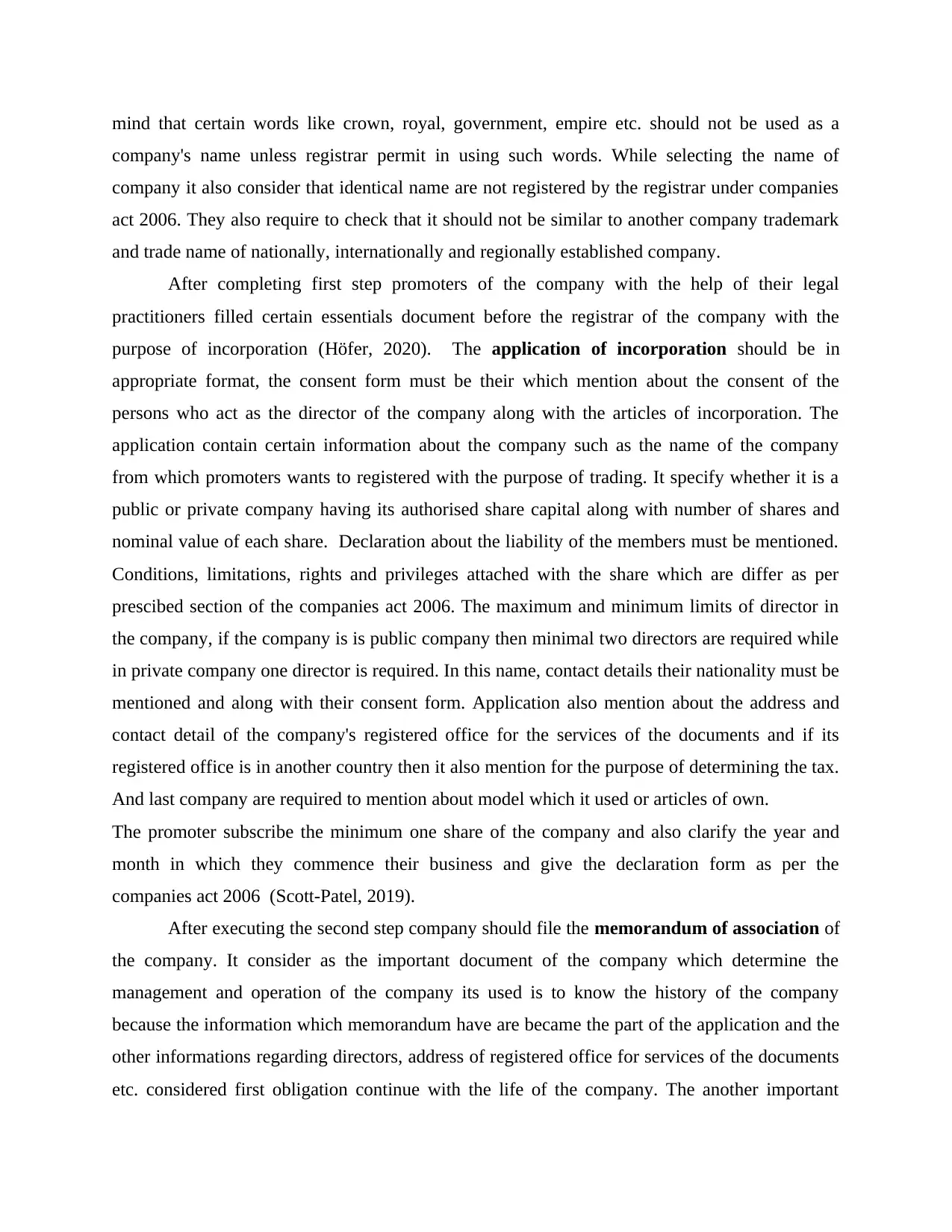
mind that certain words like crown, royal, government, empire etc. should not be used as a
company's name unless registrar permit in using such words. While selecting the name of
company it also consider that identical name are not registered by the registrar under companies
act 2006. They also require to check that it should not be similar to another company trademark
and trade name of nationally, internationally and regionally established company.
After completing first step promoters of the company with the help of their legal
practitioners filled certain essentials document before the registrar of the company with the
purpose of incorporation (Höfer, 2020). The application of incorporation should be in
appropriate format, the consent form must be their which mention about the consent of the
persons who act as the director of the company along with the articles of incorporation. The
application contain certain information about the company such as the name of the company
from which promoters wants to registered with the purpose of trading. It specify whether it is a
public or private company having its authorised share capital along with number of shares and
nominal value of each share. Declaration about the liability of the members must be mentioned.
Conditions, limitations, rights and privileges attached with the share which are differ as per
prescibed section of the companies act 2006. The maximum and minimum limits of director in
the company, if the company is is public company then minimal two directors are required while
in private company one director is required. In this name, contact details their nationality must be
mentioned and along with their consent form. Application also mention about the address and
contact detail of the company's registered office for the services of the documents and if its
registered office is in another country then it also mention for the purpose of determining the tax.
And last company are required to mention about model which it used or articles of own.
The promoter subscribe the minimum one share of the company and also clarify the year and
month in which they commence their business and give the declaration form as per the
companies act 2006 (Scott-Patel, 2019).
After executing the second step company should file the memorandum of association of
the company. It consider as the important document of the company which determine the
management and operation of the company its used is to know the history of the company
because the information which memorandum have are became the part of the application and the
other informations regarding directors, address of registered office for services of the documents
etc. considered first obligation continue with the life of the company. The another important
company's name unless registrar permit in using such words. While selecting the name of
company it also consider that identical name are not registered by the registrar under companies
act 2006. They also require to check that it should not be similar to another company trademark
and trade name of nationally, internationally and regionally established company.
After completing first step promoters of the company with the help of their legal
practitioners filled certain essentials document before the registrar of the company with the
purpose of incorporation (Höfer, 2020). The application of incorporation should be in
appropriate format, the consent form must be their which mention about the consent of the
persons who act as the director of the company along with the articles of incorporation. The
application contain certain information about the company such as the name of the company
from which promoters wants to registered with the purpose of trading. It specify whether it is a
public or private company having its authorised share capital along with number of shares and
nominal value of each share. Declaration about the liability of the members must be mentioned.
Conditions, limitations, rights and privileges attached with the share which are differ as per
prescibed section of the companies act 2006. The maximum and minimum limits of director in
the company, if the company is is public company then minimal two directors are required while
in private company one director is required. In this name, contact details their nationality must be
mentioned and along with their consent form. Application also mention about the address and
contact detail of the company's registered office for the services of the documents and if its
registered office is in another country then it also mention for the purpose of determining the tax.
And last company are required to mention about model which it used or articles of own.
The promoter subscribe the minimum one share of the company and also clarify the year and
month in which they commence their business and give the declaration form as per the
companies act 2006 (Scott-Patel, 2019).
After executing the second step company should file the memorandum of association of
the company. It consider as the important document of the company which determine the
management and operation of the company its used is to know the history of the company
because the information which memorandum have are became the part of the application and the
other informations regarding directors, address of registered office for services of the documents
etc. considered first obligation continue with the life of the company. The another important
⊘ This is a preview!⊘
Do you want full access?
Subscribe today to unlock all pages.

Trusted by 1+ million students worldwide
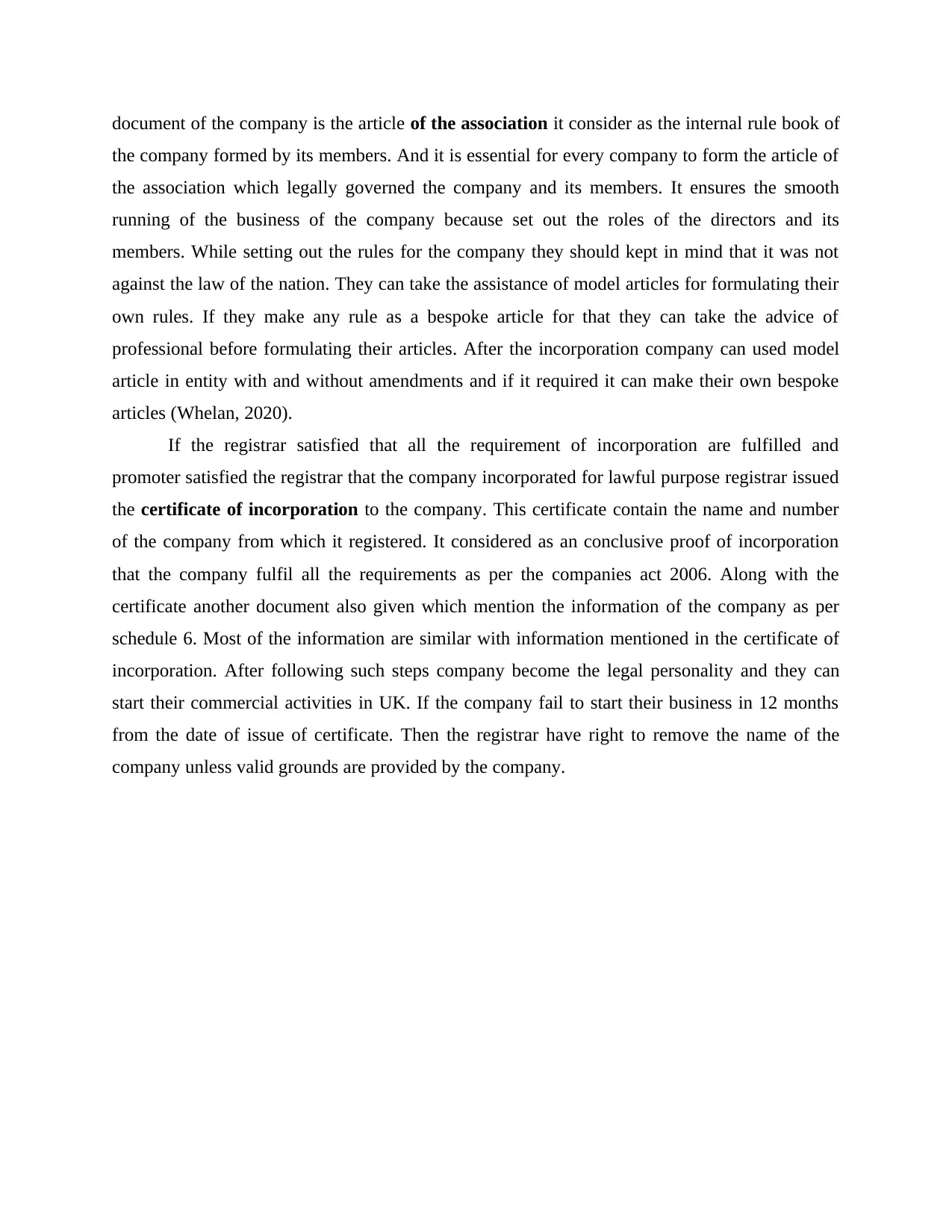
document of the company is the article of the association it consider as the internal rule book of
the company formed by its members. And it is essential for every company to form the article of
the association which legally governed the company and its members. It ensures the smooth
running of the business of the company because set out the roles of the directors and its
members. While setting out the rules for the company they should kept in mind that it was not
against the law of the nation. They can take the assistance of model articles for formulating their
own rules. If they make any rule as a bespoke article for that they can take the advice of
professional before formulating their articles. After the incorporation company can used model
article in entity with and without amendments and if it required it can make their own bespoke
articles (Whelan, 2020).
If the registrar satisfied that all the requirement of incorporation are fulfilled and
promoter satisfied the registrar that the company incorporated for lawful purpose registrar issued
the certificate of incorporation to the company. This certificate contain the name and number
of the company from which it registered. It considered as an conclusive proof of incorporation
that the company fulfil all the requirements as per the companies act 2006. Along with the
certificate another document also given which mention the information of the company as per
schedule 6. Most of the information are similar with information mentioned in the certificate of
incorporation. After following such steps company become the legal personality and they can
start their commercial activities in UK. If the company fail to start their business in 12 months
from the date of issue of certificate. Then the registrar have right to remove the name of the
company unless valid grounds are provided by the company.
the company formed by its members. And it is essential for every company to form the article of
the association which legally governed the company and its members. It ensures the smooth
running of the business of the company because set out the roles of the directors and its
members. While setting out the rules for the company they should kept in mind that it was not
against the law of the nation. They can take the assistance of model articles for formulating their
own rules. If they make any rule as a bespoke article for that they can take the advice of
professional before formulating their articles. After the incorporation company can used model
article in entity with and without amendments and if it required it can make their own bespoke
articles (Whelan, 2020).
If the registrar satisfied that all the requirement of incorporation are fulfilled and
promoter satisfied the registrar that the company incorporated for lawful purpose registrar issued
the certificate of incorporation to the company. This certificate contain the name and number
of the company from which it registered. It considered as an conclusive proof of incorporation
that the company fulfil all the requirements as per the companies act 2006. Along with the
certificate another document also given which mention the information of the company as per
schedule 6. Most of the information are similar with information mentioned in the certificate of
incorporation. After following such steps company become the legal personality and they can
start their commercial activities in UK. If the company fail to start their business in 12 months
from the date of issue of certificate. Then the registrar have right to remove the name of the
company unless valid grounds are provided by the company.
Paraphrase This Document
Need a fresh take? Get an instant paraphrase of this document with our AI Paraphraser
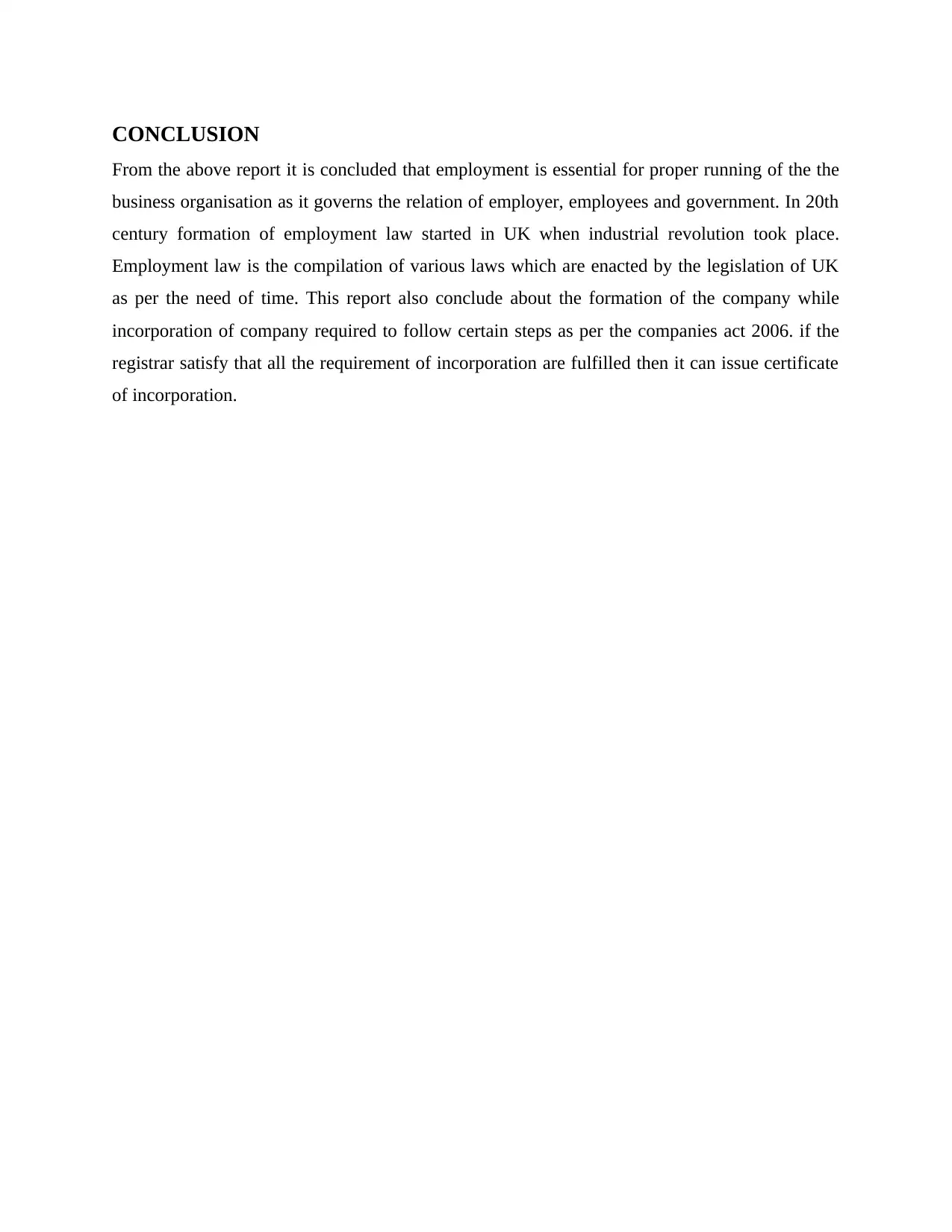
CONCLUSION
From the above report it is concluded that employment is essential for proper running of the the
business organisation as it governs the relation of employer, employees and government. In 20th
century formation of employment law started in UK when industrial revolution took place.
Employment law is the compilation of various laws which are enacted by the legislation of UK
as per the need of time. This report also conclude about the formation of the company while
incorporation of company required to follow certain steps as per the companies act 2006. if the
registrar satisfy that all the requirement of incorporation are fulfilled then it can issue certificate
of incorporation.
From the above report it is concluded that employment is essential for proper running of the the
business organisation as it governs the relation of employer, employees and government. In 20th
century formation of employment law started in UK when industrial revolution took place.
Employment law is the compilation of various laws which are enacted by the legislation of UK
as per the need of time. This report also conclude about the formation of the company while
incorporation of company required to follow certain steps as per the companies act 2006. if the
registrar satisfy that all the requirement of incorporation are fulfilled then it can issue certificate
of incorporation.
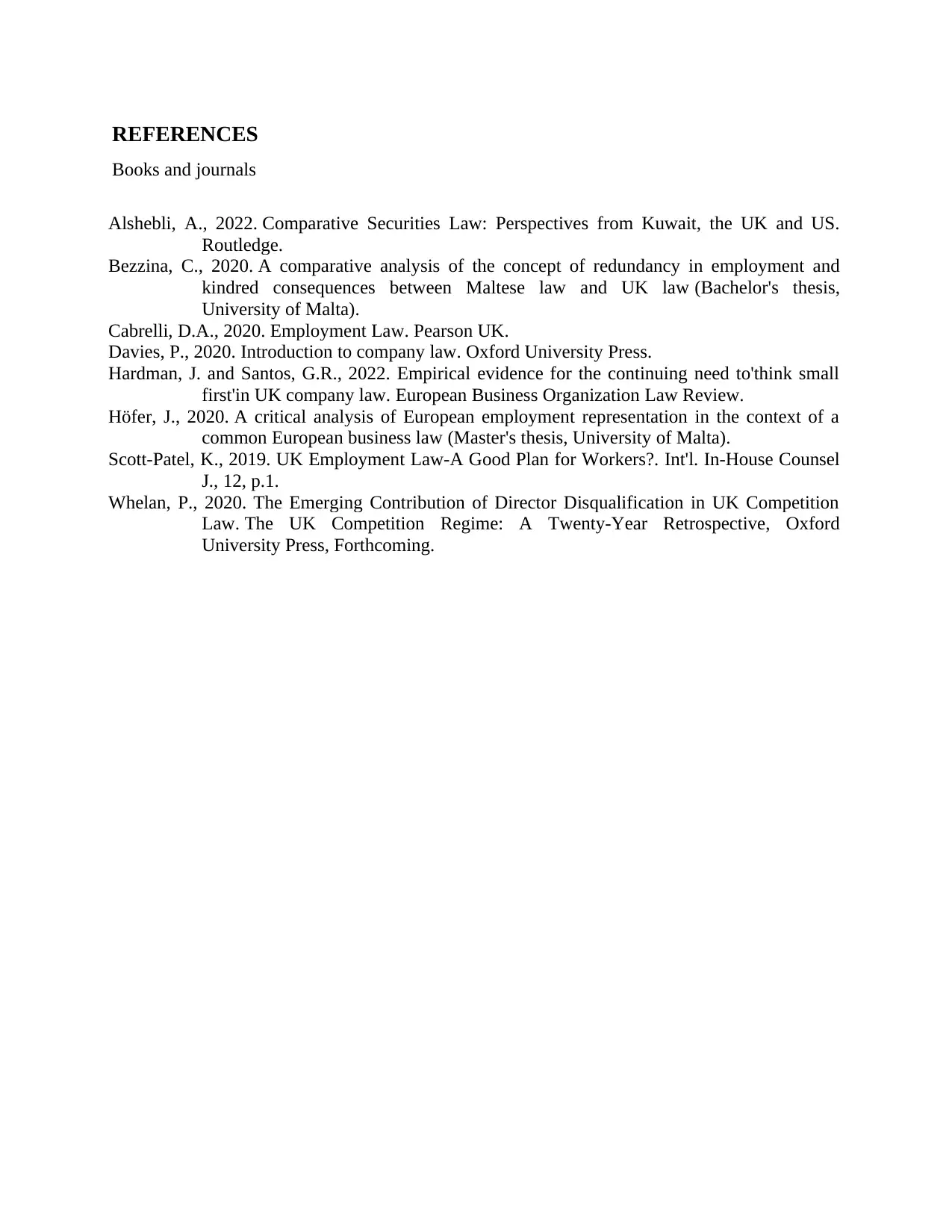
REFERENCES
Books and journals
Alshebli, A., 2022. Comparative Securities Law: Perspectives from Kuwait, the UK and US.
Routledge.
Bezzina, C., 2020. A comparative analysis of the concept of redundancy in employment and
kindred consequences between Maltese law and UK law (Bachelor's thesis,
University of Malta).
Cabrelli, D.A., 2020. Employment Law. Pearson UK.
Davies, P., 2020. Introduction to company law. Oxford University Press.
Hardman, J. and Santos, G.R., 2022. Empirical evidence for the continuing need to'think small
first'in UK company law. European Business Organization Law Review.
Höfer, J., 2020. A critical analysis of European employment representation in the context of a
common European business law (Master's thesis, University of Malta).
Scott-Patel, K., 2019. UK Employment Law-A Good Plan for Workers?. Int'l. In-House Counsel
J., 12, p.1.
Whelan, P., 2020. The Emerging Contribution of Director Disqualification in UK Competition
Law. The UK Competition Regime: A Twenty-Year Retrospective, Oxford
University Press, Forthcoming.
Books and journals
Alshebli, A., 2022. Comparative Securities Law: Perspectives from Kuwait, the UK and US.
Routledge.
Bezzina, C., 2020. A comparative analysis of the concept of redundancy in employment and
kindred consequences between Maltese law and UK law (Bachelor's thesis,
University of Malta).
Cabrelli, D.A., 2020. Employment Law. Pearson UK.
Davies, P., 2020. Introduction to company law. Oxford University Press.
Hardman, J. and Santos, G.R., 2022. Empirical evidence for the continuing need to'think small
first'in UK company law. European Business Organization Law Review.
Höfer, J., 2020. A critical analysis of European employment representation in the context of a
common European business law (Master's thesis, University of Malta).
Scott-Patel, K., 2019. UK Employment Law-A Good Plan for Workers?. Int'l. In-House Counsel
J., 12, p.1.
Whelan, P., 2020. The Emerging Contribution of Director Disqualification in UK Competition
Law. The UK Competition Regime: A Twenty-Year Retrospective, Oxford
University Press, Forthcoming.
⊘ This is a preview!⊘
Do you want full access?
Subscribe today to unlock all pages.

Trusted by 1+ million students worldwide
1 out of 9
Related Documents
Your All-in-One AI-Powered Toolkit for Academic Success.
+13062052269
info@desklib.com
Available 24*7 on WhatsApp / Email
![[object Object]](/_next/static/media/star-bottom.7253800d.svg)
Unlock your academic potential
Copyright © 2020–2026 A2Z Services. All Rights Reserved. Developed and managed by ZUCOL.




